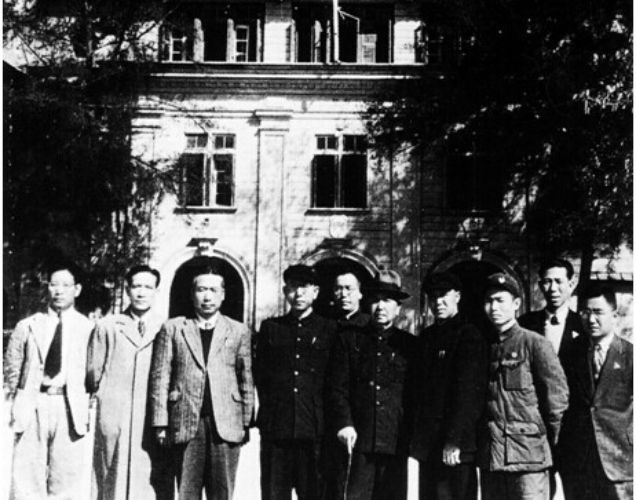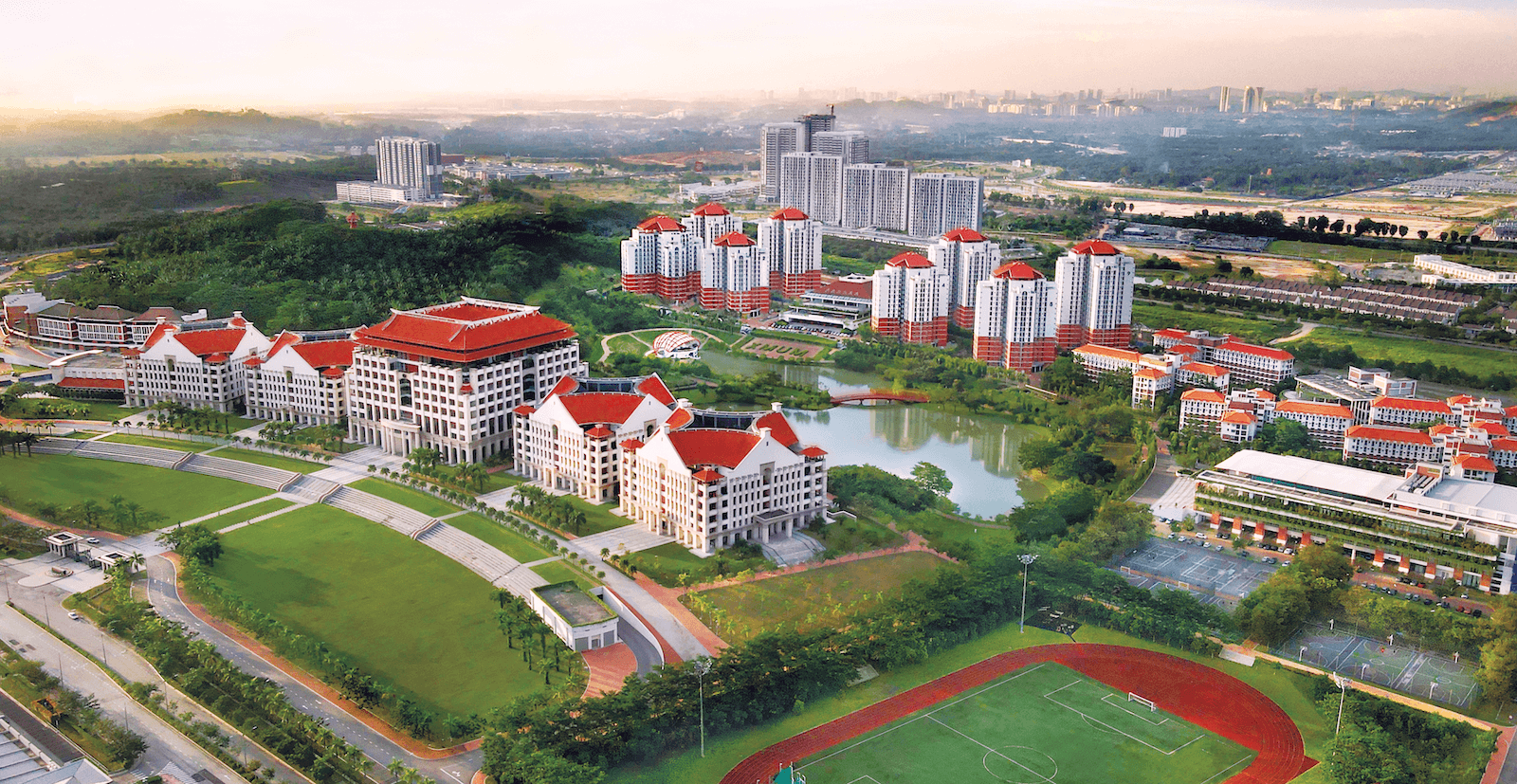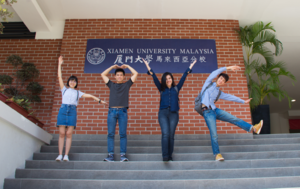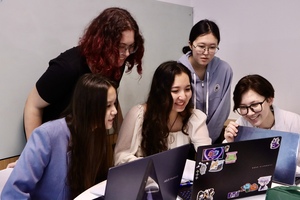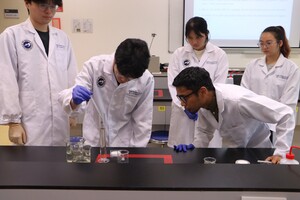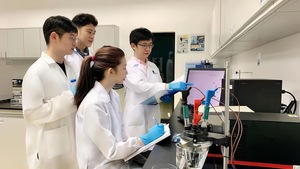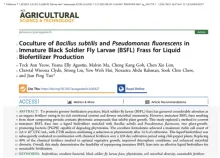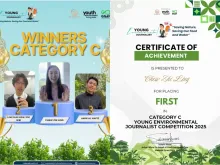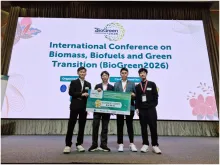PhD Student from School of Energy and Chemical Engineering Receives Green Talent Award 2022
Ng Sue Faye, a PhD student under the supervision of Assoc. Prof. Ong Wee Jun in New Energy Science and Technology, Xiamen University Malaysia (XMUM), received Green Talent Award 2022 for her research achievement in polymeric carbon nitride nanomaterials for solar-to-chemical conversion.
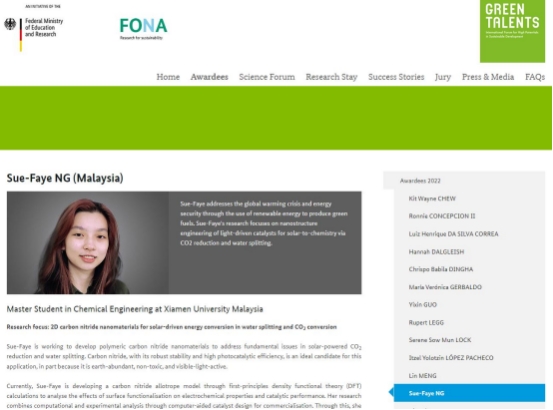
Ng Sue Faye’s page at Green Talents Awards website
Hosted by the German Federal Ministry of Education and Research, this award aims to promote the international exchange of innovative green ideas within the field of sustainability. Each year, 25 young researchers from different countries and disciplines will be selected for their achievements and efforts in making their communities, countries and societies more sustainable.
“Her work has the potential to make significant contributions to the energy transition,” said the jury in Ng Sue Faye’s official page. With the purposes of addressing global climate challenges and achieving a circular carbon economy, her research also aligns with three of the UN Sustainable Development Goals - Goal 7 (Affordable and Clean Energy), Goal 12 (Responsible Consumption and Production), and Goal 13 (Climate Action).
"I'm honoured to have my research recognized by an international body," said Ng Sue Faye, "It gave me much motivation to my future studies."
“I’m very grateful to my supervisor Dr. Ong Wee Jun and my team for being there with me and supporting me during my postgraduate study. Of course, the School has supported me a lot during my journey. I'm very grateful for being at this position.”
Ng Sue Faye is one of the three Green Talents awardees from Malaysia this year, as well as the third awardee affiliated with Xiamen University Malaysia. Previously, Dr. Yong Wai Fen and Dr. Ong Wee Jun from the School of Energy and Chemical Engineering received the award in 2016 and 2018, respectively.
As an awardee, Ng Sue Faye will be invited to attend a fully-funded research stay and spend up to three months at a German facility in 2023, advancing her professional career while establishing relationships. Additionally, she is offered the rare opportunity to specifically talk about projects and potential research collaborations with a few world-class scientists in the field of energy and chemical engineering, including Prof. Markus Antonietti from Max Planck Institute of Colloids and Interfaces, Prof. Jennifer Strunk from the Leibniz-Institute for Catalysis, and Dr. Fatwa Abdi from Helmholtz Zentrum-Berlin.
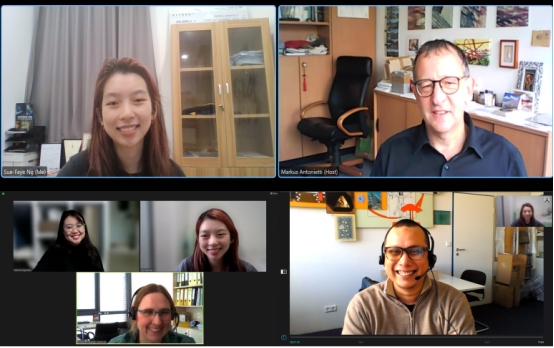
Ng Sue Faye with Prof. Markus Antonietti (top), Prof. Jennifer Strunk and Dr. Reibellle Raguindin (left bottom), and (c) Dr. Fatwa Abdi (right bottom)
Ng Sue Faye’s research focus is “2D carbon nitride nanomaterials for solar-driven energy conversion in water splitting and CO2 conversion”. Currently, she is developing polymeric carbon nitride nanomaterials to address fundamental issues in solar-powered CO2 reduction and water splitting.
“In simple terms, I'm using solar energy to convert water into hydrogen - a useful fuel that doesn't produce any byproducts such as CO2,” Ng Sue Faye introduced.
“Fossil fuels may be depleted by another 40 years, which is within our lifetime, so I believe that we need to look at some new technologies of clean fuel, to sustain ourselves to the next generation by developing technologies that allow us to achieve a circular carbon economy.”
Ng Sue Faye first came up with this idea in her Nanomaterials class, when she was still a year-3 bachelor's student in Chemical Engineering. She recalled that the lecturer - Dr. Ong Wee Jun - introduced his research to the students, saying it's mimicking the photosynthesis of the leaf and converting carbon dioxide and water into energy.
After that, Ng Sue Faye joined Dr. Ong Wee Jun’s team as a research assistant in Chemical Engineering, and decided to stay and pursue her PhD degree in New Energy Science and Technology, which is difficult, but “an interesting challenge” to her. From 2020 to 2022, she published 14 research papers and reviews in international journals within the fields of nanomaterials, photocatalysis, and energy storage. She has also attended multiple virtual/physical conferences (ICEM 2021, Catalysis Science & Technology 10th Anniversary Symposium) in an effort to network with other researchers in her field.
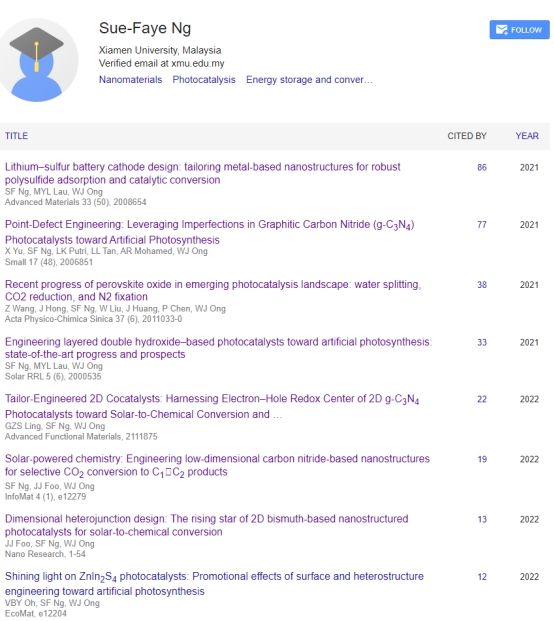
Selected publication of Ng Sue Faye
Currently, Ng Sue Faye is in Dr. Ong Wee Jun’s research group with 3 other postgraduate students (Joel Jie Foo, Grayson Ling Zhi Sheng, Xin Quan Tan) and 1 postdoctoral research fellow (Dr. Tan Ji Siang). They are also working on the projects funded by the Ministry of Science, Technology and Innovation (MOSTI), the Ministry of Higher Education (MOHE), and NanoMalaysia Bhd.
“Research is not a one person, but a group effort,” Ng Sue Faye commented, “The lab has a good environment - Even with different topics, we can always see how others conduct their respective research and learn from each other.”
Ng Sue Faye said that her goal is to continue doing research and bridge the gap to the large-scale application of sustainable fuels. In the future, she would like to work in a multidisciplinary research team on upscale photocatalytic technology. She also wants to play a role in improving communication among academia, industry and government, and making research easier to be integrated into the industry.
She summarized at the end of the interview: “Research will be quite difficult, but rewarding. Only choose the path in your life that you are really passionate about and then you will end up enjoying the most.”
Ng Sue Faye would like to give a special thanks to the funding agencies locally and globally for the continuous support in her research work thus far. These include the Fundamental Research Grant Scheme (FRGS), Xiamen University Malaysia Research Fund (XMUMRF), funding from the 12th Malaysia Plan, the National Natural Science Foundation of China and the Guangdong Basic and Applied Basic Research Foundation.

